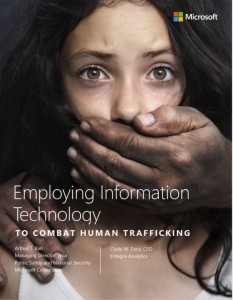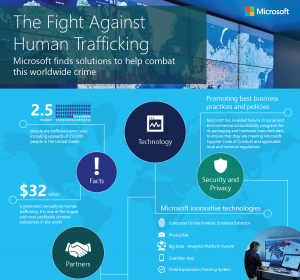Arthur Ball, Managing Director, Asia, Public Safety and National Security, Microsoft, will be participating at the Regional Conference on ICT to Combat Human Trafficking in Bangkok, Thailand on 23 June. The event agenda can be found here.
The exploitation of human trafficking can take the form of sexual slavery, forced labor, surrogate child-bearing and even organ harvesting. Regardless of the motives, it is a blight on humanity and combatting it has proved a complex and so far frustrating task.

Despite the best efforts of law enforcement, governments, intergovernmental and non-governmental organizations, and of anti-trafficking advocates, furthering progress against this scourge remains a critical humanitarian issue. Human trafficking is one of the largest, best-organized and most profitable types of crime, ranking behind only the illegal weapons and drug trades. It violates numerous national and international laws and has ensnared more than 25 million people around the world.
Microsoft believes that the technologies of today’s “mobile-first, cloud-first” world can be used to help disrupt the global problem of human trafficking. Technology can not only make law enforcement more efficient, it can be used to educate those at risk and their families, and can disrupt criminal operations by increasing the risk and reducing the rewards of their activities.
We are also committed to investing in research and in government and industry partnerships to help understand the role of technology in combatting human trafficking. We have recently sponsored six different research teams in order to create a better understanding of the role of technology in the advertising, sale, and purchase of child trafficking victims.
Microsoft efforts and technologies now being applied to combat trafficking include:
- Microsoft Digital Crimes Unit (DCU). This organization of attorneys, investigators, forensic analysts, and business professionals in 30 countries around the world assist law enforcement in combatting all types of cybercrime to help create a safer digital world.
- PhotoDNA. This product creates a unique fingerprint-like signature for images that can be used to better identify child pornography online and has been donated to Interpol for its International Child Sexual Exploitation (ICSE) database.
- Child Exploitation Tracking System (CETS). A software-based solution, developed in collaboration with Canadian law enforcement, which manages and links child protection cases across jurisdictional boundaries worldwide.
- Computer Online Forensic Evidence Extractor (COFEE). This kit helps computer forensic investigators extract digital evidence from any computer using a Windows operating system.
- Guardian App. This app leverages mobile technology to provide real time tracking, two-way communication and enhanced situational awareness for those at risk, their families and law enforcement.

Academia and technology companies must work proactively with those combatting human trafficking, helping to understand and address how technology is being abused by these criminals, investigating effective techniques for intervention and disruption, and establishing industry best practices and guidance.
We have only scratched the surface in cooperating to combat the blight of human trafficking. There is an incredible amount of work remaining to understand how technology is being used by traffickers, and how it can be used to defeat them. Microsoft and its partners are committed to supporting law enforcement and humanitarian organizations as they look to incorporating technology to further their efforts in this battle. Increased public awareness, strong public-private partnerships (PPPs) and cooperation across the community of interest must be based on an understanding of the potential impact of innovative technologies and the implications of employing disruptive technology to address human trafficking.
Microsoft, alongside the International Organization for Migration (IOM), the United Nations Action for Cooperation against Trafficking in Persons (UN-ACT), United Nations Children’s Fund (UNICEF), the United Nations Office on Drugs and Crime (UNODC), UN Women, the U.S. Agency for International Development (USAID) and the United States is sponsoring a Regional Conference on Information Communication Technology (ICT) to Combat Human Trafficking in Bangkok, Thailand on 23-24 June 2015 at the Shangri-La Hotel.
The conference aims to highlight the role that technology can play in current efforts to combat human trafficking and to inspire new approaches to prevention, protection and prosecution of human trafficking. The detailed event agenda can be found here.




